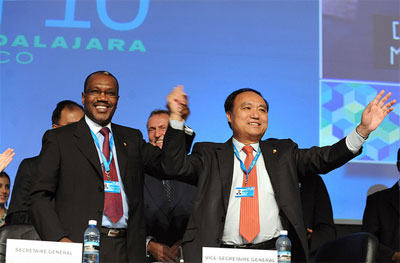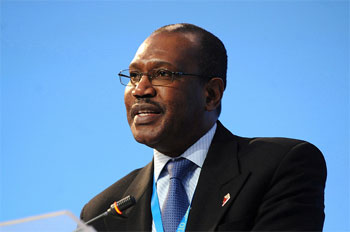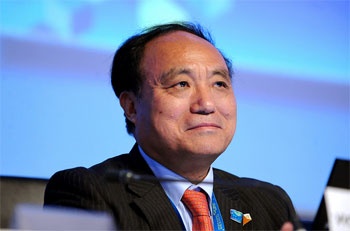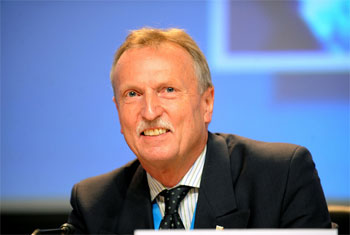|
Conference re-elects Dr Hamadoun Touré as Secretary General of ITU; Houlin Zhao as Deputy Secretary-General; and Malcolm Johnson as Director of the Telecommunication Standardization Bureau

Dr Hamadoun I. Touré and
Houlin Zhao after their re-election |
Elections got under way on 7 October 2010, with the conference re-electing Dr Hamadoun Touré as Secretary-General of ITU; Houlin Zhao as Deputy Secretary-General; and Malcolm Johnson as Director of the Telecommunication Standardization Bureau (TSB). All three were first elected to these posts at the ITU Plenipotentiary Conference in Antalya, Turkey, in November 2006 and took office on 1 January 2007.
Elections will continue on 8 October for the other two top posts of Director of the Radiocommunication Bureau (BR) and of Director of the Telecommunication Development Bureau (BDT). Both posts have three contenders as follows: Fabio Leite (Brazil); François Rancy (France) and Dr Veena Rawat (Canada). Contenders for the post of BDT Director are: Sami Al Basheer Al Morshid (Saudi Arabia), who holds the post since 2007; Héctor Olavarría-Tapia (Mexico); and Brahima Sanou (Burkina Faso).
Dr Touré praised for his great leadership
Dr Touré was re-elected with 151 votes out of 157 countries present and voting. The required majority was 76. Dr Touré was sole candidate for the post. During the four-year period, he has made ITU an innovative, forward-looking organization adapted to meeting the challenges of an ever-changing telecommunications environment. He has spearheaded ITU’s efforts towards implementing the outcomes of the World Summit on the Information Society (WSIS) and achieving the Millennium Development Goals. His commitment to tackling global issues head-on have won him the reputation of a great world leader. These issues include bridging the digital divide (now the broadband divide); emergency telecommunications; and cybersecurity and climate change. Work in these areas has contributed to raising ITU’s visibility on the world stage.
In recognition of these efforts, delegations from all regions of the world were unanimous in expressing their full confidence and trust in Dr Touré’s leadership. From the Americas to Western Europe; and from Eastern Europe and Northern Asia to Africa and to Asia and Australasia, each delegation that took the floor expressed overwhelming support and immense satisfaction, stating that they looked forward to working with ITU’s top management in the coming four years to take the Union to even greater heights.

Dr Hamadoun I. Touré
ITU Secretary-General |
Addressing the conference, Dr Touré first paid tribute to his late parents, saying that “they would have been very proud of this result”. He thanked his wife and four children for the full support they have given him, allowing him to focus on the job. He extended his thanks to the President of Mali, the Prime Minister and other Ministers, as well as to the African Union for their unconditional support. He said that his re-election would inspire youth in Mali and throughout Africa, who consider him as their role model. He then thanked his current management team of elected officials for their steadfast commitment to the Union.
Looking to the future, Dr Touré said he would place special emphasis on broadband access and would continue to ensure that cybersecurity is high on everyone’s agenda. Small island developing States and land-locked countries too would be given special attention. Quoting the words “Deserve your dream!” or “Merece lo que sueñas!” of the great Mexican poet, writer and diplomat Octavio Paz, Dr Touré said his dream is “to ensure that every citizen on the planet can connect to, use, create and share information, in a safe and affordable manner”.
Dr Touré holds a Masters Degree in Electrical Engineering from the Technical Institute of Electronics and Telecommunications of Leningrad, and a PhD degree from the University of Electronics, Telecommunications and Informatics of Moscow. Before becoming Secretary-General, he served as Director of BDT (1999-2006), following his election at the Plenipotentiary Conference in Minneapolis in 1998. He was re-elected for a second term at Marrakesh in 2002. In this position, he played a significant role in the WSIS process, launching numerous projects based on building partnerships with international organizations, governments, civil society and the private sector.
Before joining ITU, Dr Touré was Africa’s Regional General Manager for ICO Global Communications (1996–1998). He spearheaded the company’s activities from its Africa Regional Office in South Africa, where he laid the foundation to ensure the successful introduction and operation of ICO’s regional operations.
He joined the International Telecommunications Satellite Organization (INTELSAT) in 1985, where he held several key positions. Between 1990 and 1994, he was INTELSAT's Director for the Africa Region, later serving as the Group Director for Africa and the Middle East (1994-1996). In these positions he managed annual revenue budgets of more than USD 115 million.
On the national scene, he worked at the International Satellite earth station in Mali’s capital Bamako (1981-1985), which culminated in his heading the Satellite Communications Section of Mali’s Office des Postes et Télécommunications (OPT).
Mr Zhao’s re-election
Houlin Zhao (China), was re-elected Deputy Secretary-General with 155 votes out of 157 countries present and voting. The required majority was 78. He was sole candidate for the post.

Houlin Zhao, Deputy-Secretary-General of ITU |
Speaking after his re-election, Mr Zhao thanked ITU members and, in particular, the Chinese government for their decision to put forward his candidature, as well as the ITU staff for “their invaluable support and cooperation”. He offered his congratulations to Dr Touré on his re-election, describing how the Secretary-General has constantly shown full confidence in him and respect over the last four years. “Thanks to his goodwill, we have a very enjoyable working environment between the two of us. Having been re-elected at the same time for both of us, I see a clear message from you all that you appreciate the good relationship between us and that you wish us to continue.” He assured the membership that he would do his best not only to fulfil his responsibilities as Deputy Secretary-General, but also to assist the Secretary-General in the management of the Union.
He thanked his colleagues of the current management team, wishing both Mr Johnson and Mr Al Basheer well in their re-election. Turning to Valery Timofeev, current Director of BR, who will soon be completing his second term in office, he described him as “a wonderful colleague with a very rich professional knowledge, very strong leadership skills, and very friendly personality”.
Mr Zhao graduated from Nanjing University of Posts and Telecommunications, China, in 1975 and received an MSc degree from the University of Essex (United Kingdom) in 1985. After working in various engineering positions at China’s Ministry of Posts and Telecommunications, he joined ITU in 1986. He was elected as Director of TSB in 1998, and re-elected to this post at the Marrakesh Plenipotentiary Conference in 2002.
In his two terms as Director of TSB (1999-2006), he introduced effective and efficient measures to improve ITU's standards environment and strengthened its promotion. He also enhanced the strategic partnership between Member States and Sector Members, while initiating and maintaining good relations with industry members. Under his leadership, ITU’s Telecommunication Standardization Sector (ITU-T) facilitated international cooperation with other standards development organizations and forums and helped bridge the standardization gap between the developing and developed countries.
Mr Johnson’s re-election

Malcolm Johnson
Director of the Telecommunication
Standardization Bureau |
Malcolm Johnson (United Kingdom), was re-elected Director of the Telecommunication Standardization Bureau with 152 votes out of 156 countries present and voting. The required majority was 77.
Thanking all those Member States that voted for him, Mr Johnson said: “I will make every effort to prove myself worthy of the confidence that you have placed in me and to meet the challenges facing us. My election has been a particularly happy one as it has not resulted in losing a candidate!” He thanked the UK government for nominating him for a second term and in particular the UK Ambassador to Mexico, Ms Judith Macgregor for her presence in Guadalajara and for her support.
He also expressed his gratitude to “TSB staff for their hard work”; to his fellow elected colleagues “for their collaboration”; and most of all, to the Secretary-General “for his leadership and inspiration”. Mr Johnson added: “We are truly lucky to have such a wonderful Secretary-General, and congratulations again to Hamadoun and Houlin on their brilliant re-election. I really look forward to being part of the Secretary-General’s team for another four years.” He also thanked his wife Catherine “for her tremendous support”.
He underlined that in his second term, he would pursue the objective of making ITU-T even more relevant and valuable to the entire membership, especially the developing countries.
Taking the floor, Ms Macgregor said the results of the re-election were a very clear endorsement, adding that Mr Johnson had achieved a lot in the last four years and that the work he will take forward with the rest of the top team will be of great importance to the rest of the world.
After obtaining an MSc degree, Mr Johnson joined the UK government and in 1992 became Director in the Radiocommunications Agency. In 2003, he joined the Office of Communications (Ofcom), where he was International Coordinator with responsibility for the UK in ITU and at the European Conference of Postal and Telecommunications Administrations (CEPT).
Since his election in 2006 as Director of TSB, Mr Johnson has driven forward work in important areas such as climate change, accessibility, and bridging the standardization gap. The ITU-T Voluntary Fund on Bridging the Standardization Gap is an important means to offer training and to help developing countries obtain the necessary capability to participate effectively in global and regional standards bodies. Overall participation in the work of ITU-T has increased (despite the economic downturn), with a record 236 ITU-T Recommendations (standards) adopted in 2008 alone. Much of ITU’s current work on the impact of ICT on climate change originated in TSB under his leadership, with the publication of a Technology Watch report in 2007.
|